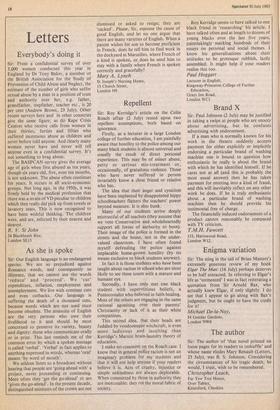Repellent
Sir: Roy Kerridge's article on the Colin Roach affair (2 July) rested upon two repellent assumptions, both based on ignorance.
Firstly, as a lecturer in a large London college of further education, I am painfully aware that hostility to the police among our many black students is almost universal and usually the result of direct personal experience. This may be of minor abuse, petty or serious mis-treatment or, occasionally, of gratuitous violence. Those who have never suffered in person invariably know a close friend or relative who has.
The idea that their anger and cynicism have been implanted by disappointed hippy schoolteachers flatters the teachers' power beyond measure. It is also bunk.
Many of our students arrive deeply mistrustful of all teachers (they assume that we vote Conservative and wholeheartedly support all forms of authority to boot). Their image of the police is formed in the streets and the home, not in the under- valued classroom. I have often found myself defending the police against implacable home-grown hostility (by no means exclusive to black students anyway).
In fact it is those students who have been taught about racism in school who are most likely to see these issues with a mature and humane eye.
Secondly, I have only met one black student with superstitious beliefs, a Pentecostalist who believed in faith healing. Most of the others are engaging in the same rational agonising over their parents' Christianity or lack of it as their white companions.
This second idea, that their heads are fuddled by voodooesque witchcraft, is even more ludicrous and insulting than Kerridge's Marxist brain-laundry theory of education.
I make no comment on the Roach case. I know that in general police racism is not an imaginary problem for my students and that it will not help anyone if your readers believe it is. Acts of cruelty, injustice or simple unkindness are always deplorable. When committed by those in authority they are inexcusable: they rot the moral fabric of society. Roy Kerridge seems to have talked to one black friend in 'researching' his article. I have talked often and at length to dozens of young blacks over the last five years, painstakingly marking hundreds of their essays on personal and social themes. I know his generalisations about their attitudes to be grotesque rubbish, lazily assembled. It might help if your readers realise this too.
Paul Hoggart
Lecturer in English, Kingsway-Princeton College of Further Education, Grays Inn Road, London WCI






































 Previous page
Previous page